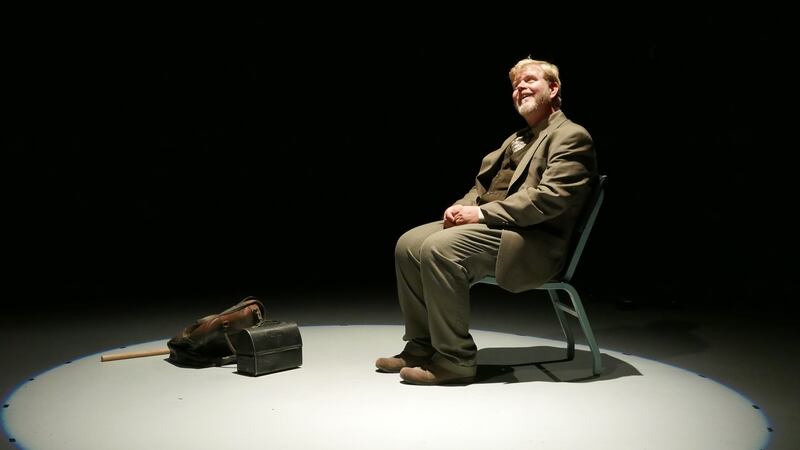A man in a brown, three-piece suit steps onto the stage. Thanks to his tidy beard and graying, carefully combed hair, he looks thoroughly ordinary. Yet something is off. While the man is clearly a character in a play, he enters not from offstage but from the hallway, as if he were a confused member of the audience unable to find his seat.
That is how Imago Theatre's production of Will Eno's moving and mystifying Title and Deed begins. It's an attention-getting way to start a story, but it's also a declaration that the play will bulldoze through the fourth wall and invite us to experience everything about this man that provokes, delights and disturbs him.
This is not an easy invitation to accept. Eno, who has been compared to Samuel Beckett, relishes rambling soliloquies that leapfrog from topic to topic so rapidly there are times when you want to shout, "Get to the point!" Yet Jerry Mouawad's subtly imaginative direction and Todd Van Voris' quietly formidable performance unmask the flaming emotional core of the play, keeping you transfixed even when the narrative takes baffling detours.
Title and Deed introduces us to a nameless man (Van Voris) who spends 90 minutes offering up cryptic philosophical asides and life memories. We discover his parents are dead, he's a veteran of failed romances and a foreigner, although he never specifies where he's from. His accent is American, but Eno is so cagey that for all we know, he could've just arrived from Mars.
The man's musings often go nowhere. He's fond of peculiar proclamations such as, "I once was—no, I probably never was." Yet it soon becomes clear that Title and Deed is building to something volcanic. While the man says, "I swear I am, like you, not unhappy," he is revealed to be nothing if not unhappy, and in the play's final moments, his misery bursts forth like an angry geyser.
The journey to that eruption is occasionally frustrating. Abruptly inserted lines like "Electricity—let's talk about that," suggest that Eno views the play as a vehicle to challenge an audience's expectation that one scene will flow cleanly into the next. That's not entirely bad, but the trouble with theatrical experiments is they sometimes feel like schematic exercises rather than full-bodied works of art.
Yet there's nothing schematic about the intimacy created by the play's gifted crew and one-man cast. The spare set—which features little more than a chair, a clothing rack, a desk and a lamp lit by a single bulb—draws you close to Van Voris' beautifully etched physical details. Just watch the way he intently yet nervously rubs his thighs. Without saying a word, he signals to us that this is a character who is at once ashamed of and fascinated by his own body.
That moment is embarrassing to watch—you feel as if you are witnessing something not meant to be seen. Or looking in the mirror. The power of Title and Deed lies in the way it reveals moments of vulnerability that many of us have experienced but wouldn't admit to. That's the reason the man enters like someone from the audience. He's us.
SEE IT: Title and Deed is at Imago Theatre, 17 SE 8th Ave., imagotheatre.com. 7:30 pm Thursday-Saturday, 2 pm Saturday, Aug. 23-25. $15-$20.
